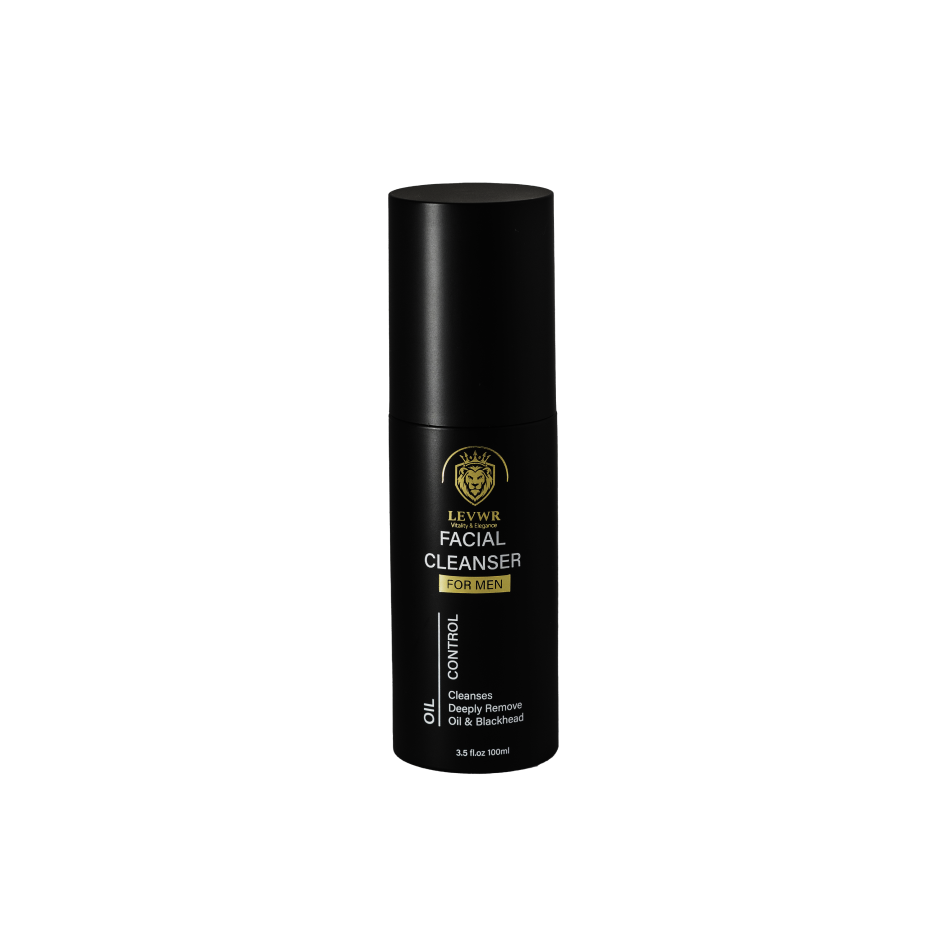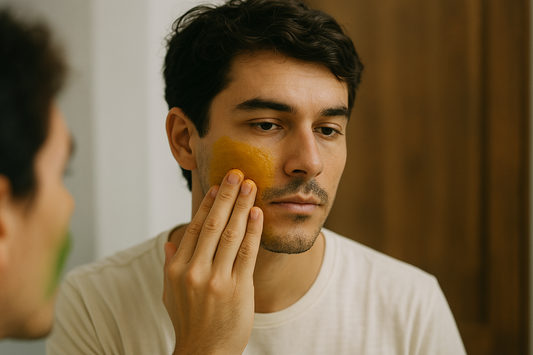Sensitive Skin Struggles? Here’s How to Soothe & Protect It
Levell Rampono
2 mins read

Sensitive skin can be incredibly frustrating to manage. From redness and irritation to tightness and dryness, those who struggle with it are constantly on the lookout for solutions. Whether you’re dealing with skin reactions to skincare products, changes in the weather, or environmental pollutants, sensitive skin requires special care. If you’re looking for tips on soothing and protecting your delicate skin, you've come to the right place.
What Causes Sensitive Skin?
Before diving into soothing and protection methods, it’s important to understand what makes skin sensitive in the first place. Sensitive skin isn’t necessarily a skin condition; it is a skin type. Studies show that 50–60% of men experience some level of skin sensitivity. People with sensitive skin tend to react more severely to triggers than those with other skin types. The skin barrier, which acts as a protective shield against harmful environmental factors, can be weakened or damaged, leaving the skin prone to irritation, dryness, and redness.
Some common causes of sensitive skin include:
-
Genetics: Some people are born with a naturally sensitive skin type, which makes them more prone to irritation and reactions.
-
Skin Conditions: Conditions like eczema, rosacea, and psoriasis can cause the skin to become more sensitive to external factors.
-
Harsh Products: Overuse of harsh skincare products, such as exfoliants, acids, or fragrances, can damage the skin’s barrier and increase sensitivity. A study found that 78% of people experience negative side effects from using harsh products.
-
Weather and Climate: Extreme temperatures, dry air, and sun exposure can all trigger sensitive skin reactions.
-
Environmental Pollutants: Pollutants and allergens in the air can trigger irritation, making the skin red and sensitive.
How to Soothe Sensitive Skin
If you’re already dealing with sensitive skin, the goal is to soothe discomfort and reduce reactions. Since 79% of people report that their sensitive skin remains the same or worsens over time, adopting the right skincare routine is essential. Here are some methods to help calm irritated skin and restore its healthiest state.
1. Choose Gentle, Fragrance-Free Products
One of the most important steps in managing sensitive skin is choosing the right skincare products. Harsh ingredients and fragrances are common irritants, so opt for products labeled "for sensitive skin" or "hypoallergenic." These products are formulated to be gentler on the skin and avoid ingredients that are likely to cause reactions. Look for:
-
Fragrance-free: Fragrance can be a major irritant, even in small amounts.
-
Non-comedogenic: This ensures the product won’t clog pores and worsen skin issues.
-
Soothing ingredients: Aloe vera, chamomile, and calendula are all known for their calming properties.
2. Moisturize Regularly
Moisturizing is key to protecting your skin’s natural barrier. Dry skin is more likely to become irritated, so keeping it hydrated is essential. Look for a gentle, hydrating moisturizer that contains ingredients like:
-
Ceramides: These lipids help repair the skin’s natural barrier and lock in moisture.
-
Hyaluronic acid: This ingredient draws moisture into the skin, keeping it hydrated.
-
Glycerin: A humectant that helps retain moisture.
Use a moisturizer that suits your skin’s needs, whether you prefer a lightweight gel, cream, or balm, and apply it to your skin daily, preferably while your skin is still damp to lock in hydration.
3. Use Sunscreen Every Day
One of the most important steps in protecting sensitive skin is sunscreen. UV rays from the sun can worsen irritation, cause premature aging, and even lead to sunburn. For sensitive skin, choose a broad-spectrum, mineral-based sunscreen that contains zinc oxide or titanium dioxide, as these tend to be less irritating than chemical sunscreens.
Apply sunscreen every morning, even on cloudy days, and reapply it every two hours, especially if you’re outdoors. Consider using a tinted sunscreen to help protect against visible light, which can also trigger skin sensitivity.
4. Avoid Hot Water and Harsh Scrubbing
Hot water can remove the skin's natural oils, making it more prone to dryness and irritation. Instead, use lukewarm water when washing your face or taking a shower. Additionally, avoid harsh scrubbing or using rough materials like washcloths or exfoliating brushes, as these can cause micro-tears in the skin, leading to increased sensitivity and redness.
5. Incorporate Calming Ingredients Into Your Routine
Certain ingredients are known for their calming effects on sensitive skin. Incorporate them into your skincare routine to reduce inflammation and soothe irritation. Some effective ingredients to look for include:
-
Aloe vera: Known for its cooling and healing properties, aloe vera can provide instant relief for inflamed skin.
-
Chamomile: This herb has anti-inflammatory properties that help reduce redness and irritation.
-
Niacinamide: This antioxidant helps to strengthen the skin barrier and reduce redness.
How to Protect Sensitive Skin
While soothing your sensitive skin is crucial, protecting it from future damage is equally important. Implement these strategies into your daily routine to maintain healthy skin.
1. Use a Humidifier
Dry air, especially during the winter months, can cause your skin to lose moisture and become more sensitive. A humidifier can help maintain moisture levels in the air, preventing your skin from becoming excessively dry and irritated. Try placing a humidifier in your bedroom to keep your skin hydrated while you sleep.
2. Avoid Known Triggers
If you know what triggers your sensitive skin (like specific skincare products, foods, or environmental factors), try to avoid them as much as possible. Common triggers for sensitive skin include:
-
Certain skincare ingredients: Alcohol, synthetic fragrances, and sulfates can be irritating to sensitive skin.
-
Allergens: Pollen, pet dander, and dust mites can worsen skin reactions.
-
Pollution: Air pollution can cause environmental stress on the skin, leading to inflammation and sensitivity.
3. Be Gentle With Exfoliation
Exfoliating can be beneficial for removing dead skin cells, but for sensitive skin, it must be done with care. Avoid harsh physical exfoliants (like scrubs with large, rough particles) and opt for mild chemical exfoliants, such as those containing lactic acid or gentle enzymes. Limit exfoliation to once or twice a week to avoid irritating the skin.
4. Manage Stress
Stress is a common trigger for skin reactions, especially for conditions like eczema and rosacea. 90% of people with rosacea report that emotional stress contributes to their skin reactions. Finding ways to manage stress through activities like yoga, meditation, exercise, or simply taking time for yourself can help decrease the chance of skin irritation and breakouts.
5. Get Enough Sleep
Your skin repairs itself while you sleep, so getting sufficient rest is essential for maintaining its health. Aim for 7-9 hours of sleep each night to give your skin time to regenerate and strengthen its barrier. A healthy sleep routine can improve your skin’s overall appearance and reduce the occurrence of sensitivity.
Managing sensitive skin may seem challenging, but with the right care, you can keep it calm, protected, and healthy. Levwr’s gentle, nourishing skincare solutions are designed to help you hydrate, shield, and restore balance to your skin. By choosing soothing ingredients, moisturizing regularly, and using a protective sunscreen, you can minimize irritation and keep your skin feeling its best. Remember to always listen to your skin’s needs and treat it with care, and you’ll be able to enjoy a smoother, more balanced complexion.

Purifying Facial Cleanser
$47.25
A foaming cleanser that removes impurities and excess oil while preserving the skin's natural moisture. This gentle yet effective formula prepares the skin for optimal absorption of subsequent treatments.
-

The Power of Nature: Top Skincare Natural Ingre...
When it comes to skincare, everyone wants healthier, glowing skin, and that often means trying different products and ingredients. In recent years, natural skincare has become more popular because it...
The Power of Nature: Top Skincare Natural Ingre...
When it comes to skincare, everyone wants healthier, glowing skin, and that often means trying different products and ingredients. In...
Read More
-

Vitamin C in Skincare: Myths vs. Facts
Vitamin C has long been recognized as one of the most powerful ingredients in skincare. From brightening dull complexions to fighting signs of aging, it seems to do it all....
Vitamin C in Skincare: Myths vs. Facts
Vitamin C has long been recognized as one of the most powerful ingredients in skincare. From brightening dull complexions to...
Read More
-

Causes of Dandruff in Men? Understanding the Tr...
Dandruff is a common scalp condition that affects millions of people worldwide, and it’s no surprise that men are particularly prone to it. Whether you're experiencing flakes in your hair,...
Causes of Dandruff in Men? Understanding the Tr...
Dandruff is a common scalp condition that affects millions of people worldwide, and it’s no surprise that men are particularly...
Read More
- Choosing a selection results in a full page refresh.
- Opens in a new window.


